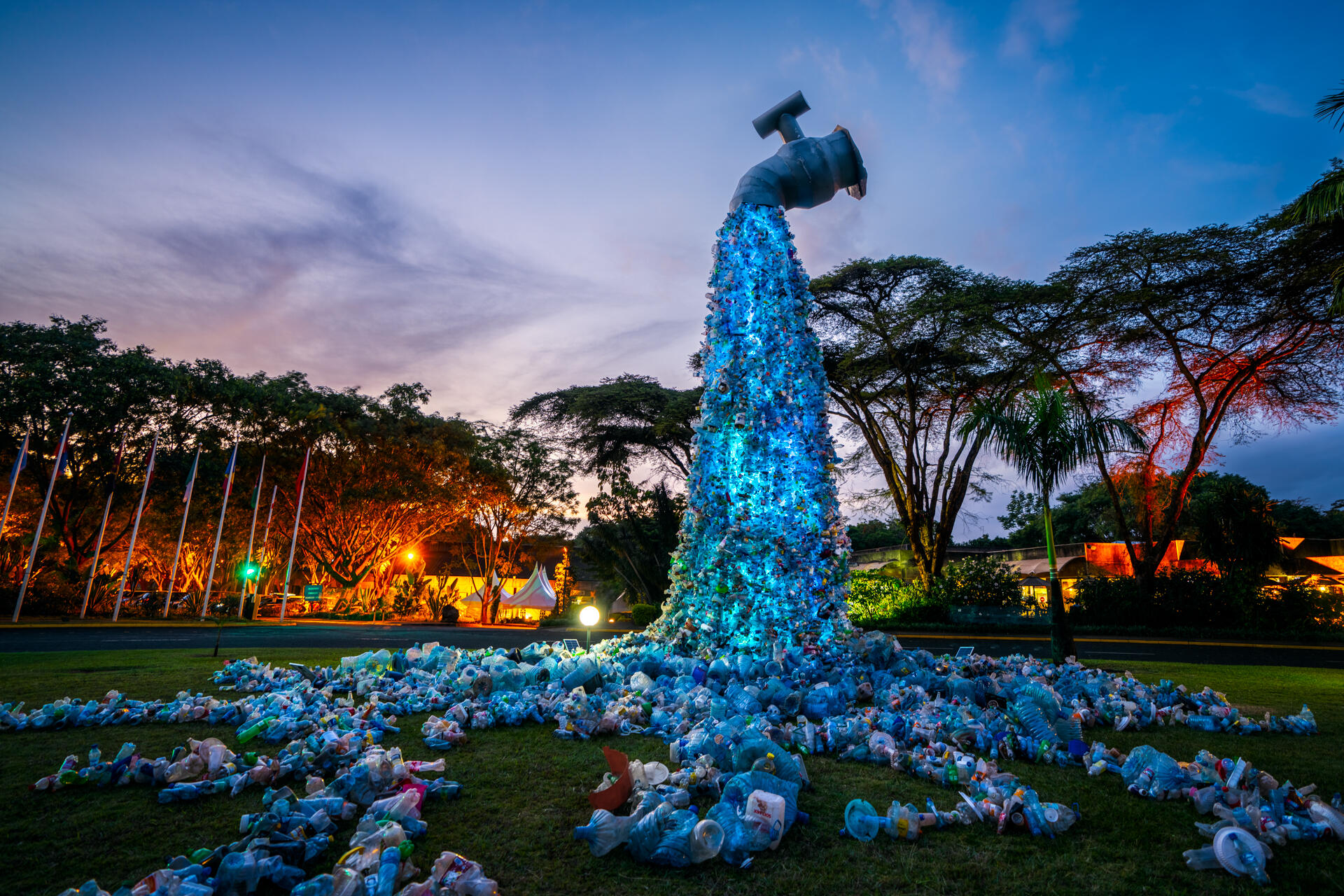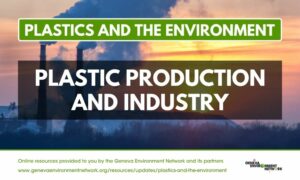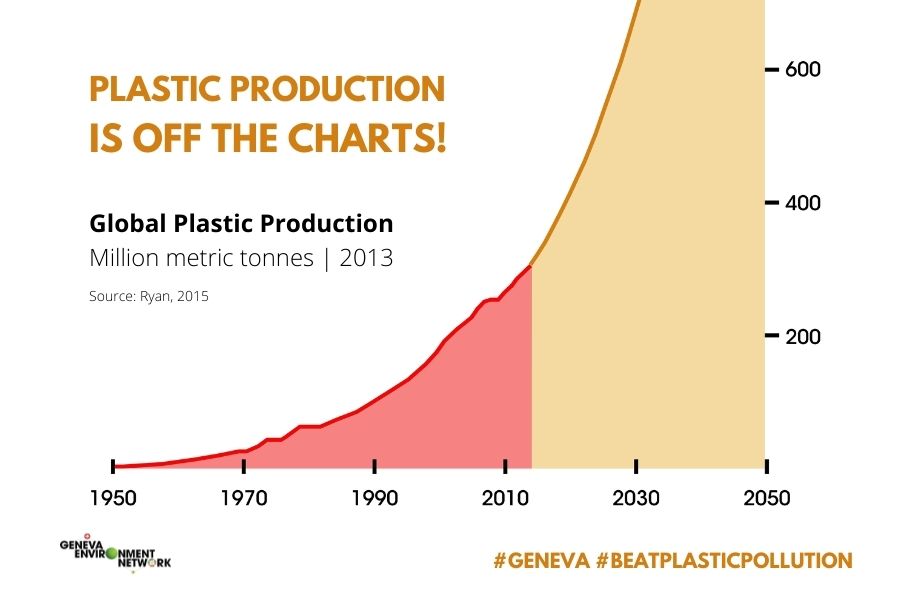Nouvelle
Plastic Production and Industry | Plastics and the Environment Series
Over the past decades, plastic production has been growing exponentially. Learn more about these trends and the industry behind it with the resources below. This page is part of our Plastics and the Environment series, a set of online resources on the plastics crisis, its impact on people and the environment, and international cooperation to address this global problem. They include resources and news from organizations in Geneva and beyond, including UN-system organizations and other IOs, governmental authorities, civil society organizations, academic institutions and journals, and renowned newspapers.
Trends in Plastic Production
The plastics industry began in the early 1900s when the first synthetic plastic was created in the U.S. Since the industry began, annual global plastic production has exploded from some 1.5 million metric tons in 1950 to 359 million metric tons in 2018 (Statista, 2020). Of the 376 Mt produced in 2019, 133 Mt, (35%) were for single-use plastics to be used almost entirely for packaging (Plastic Makers Index, 2021). Syntethic fibers, like nylon and polyester are another major output of plastic production, with annual increases of 65 Mt in the past 30 years. The costruction, transportation, electrical, and electronic production, agriculture and medical sectors are among those that use up most of plastic production. The cumulative production of plastic surpassed eight billion metric tons worldwide. Current investments in petrochemical infrastructure are supporting this trend for the decades to come. This exponential trend means that the plastic crisis will only get worse if no action is taken.
According to a 2023 report by the Nordic Council of Ministers and Systemiq, under the business-as-usual scenario, the annual levels of mismanaged plastics would continue to rise and could almost double from 110 million tonnes (Mt onwards) in 2019 to 205 Mt by 2040, an 86% increase. Annual production of virgin plastics would increase from 430 Mt in 2019 to 712 Mt by 2040, a 66% increase. GHG emissions from the plastic system could further increase from 1.9 gigatonnes of carbon dioxide equivalent (GtCO2e) per year in 2019 to 3.1 GtCO2e by 2040, an increase of 63%.
- Production, use, and fate of all plastics ever made | Roland Geyer, Jenna R. Jambeck, et al. | Science Advances | 19 July 2017
The Industry Behind Plastics
As 99% of plastics are created from chemicals of fossil origin, plastic production is closed linked to the petrochemical industry. The rapid global growth of the plastic industry is largely fueled by the availability of cheap shale gas and growing investments from the fossil industries. Indeed, petrochemicals are expected to be the largest driver of global oil demand growth from now through 2040, outpacing its use in transportation, industry, in power, or in buildings. The strong linkages between plastics and fossil fuel also mean that plastics is one large driver of climate change. Plastic production is an important contributor to global emissions associated with air and water pollution, as well as oil spills leading to toxic contaminations. An independent report commissioned by the Basel, Rotterdam and Stockholm Conventions and published in April 2023 found that up to 13,000 chemicals are possibly used in plastics as monomers, additives, processing aids and NIAS. Out of these, 3,200 are verified to be chemicals of potential concern, but the figure could be bigger considering that hazard data is missing for 6,000 chemicals. Moreover, only 1% of chemicals of concern used in plastics are regulated under MEAs, such as the Stockholm Convention, the Minamata Convention, and the Montreal Protocol. These represent gross health and human rights threats which could be prevented with the adoption of safety storage and disposal procedures of toxic substances.
Addressing Plastic Pollution from the Production Stage
Considering the scope and impacts of plastic pollution, an increasing number of actors from governments, civil society and academia are calling for efforts to tackle the crisis at its source by reducing plastic production. With current and expected levels of plastic production, end-of-the-pipe solutions, such as waste management and clean-up, are unlikely to be sufficient to efficiently tackle the plastic crisis. A report published in September 2022 by CIEL and Break Free From Plastic revealed that reducing plastic production, especially for single-use plastics, would also be a win-win with regards to the ongoing energy crisis in Europe. As plastic production accounts for 9% of EU fossil gas consumption, measures in the sector could help ensure energy security while addressing climate change and pollution.
- People vs. Plastic! Global Support for a strong Plastics Treaty | Greenpeace | 4 April 2024
- Reducing plastic production: Economic loss or environmental gain? | Mateo Cordier, Takuro Uehara, Bethany Jorgensen and Juan Baztan | Cambridge University Press | 30 January 2024
- ‘We can’t carry on’: the godfather of microplastics on how to stop them| The Guardian | 13 November 2023
- Towards Eliminating Plastic Pollution by 2040. A Policy Scenario Analysis (Interim Findings) | OECD | November 2023
- The global plastics treaty can fight climate change — if it reduces plastic production | Grist | 2 June 2023
- It’s time investors tackled single-use plastic at source | Marcus Gover, Minderoo Plastics Initiative | 16 May 2023
- Putting an End to Plastic Pollution: WWF’s Call to Urgently Regulate High-Risk Plastic Products | WWF | 15 May 2023
- Technology cannot fix this: To stay within planetary boundaries, plastic growth must be tackled | Patricia Villarrubia-Gomez, Bethanie Carney Almroth, et al. | May 2023
- Plastics Treaty: Phase Out Fossil Fuels to End Pollution | Human Rights Watch | 15 May 2023
- More than 150 countries agree to ban 3 toxic chemicals | Joseph Winters | Grist | 11 May 2023
- Inside the East Palestine Disaster: A Wake Up Call To Ban Toxic Vinyl Chloride & Go Beyond Plastics (Video) | Beyond Plastics | 17 March 2023
- Plastic Waste Maker Index 2023 | Minderoo Foundation | February 2023
- Can plastics become more sustainable? | Economist | 30 January 2023
- Assessing and managing environmental hazards of polymers: historical development, science advances, and policy options | Ksenia J. Groh, Hans Peter H. Arp, Matthew MacLeod and Zhanyun Wang | Environmental Science: Processes & Impacts | 13 December 2022
- Winter is coming, Plastic has to go – A case for decreasing plastic production to reduce the European Union’s dependence on fossil fuels and Russia | CIEL & Break Free From Plastic | September 2022
- Ahead of a Winter Energy Crisis, the EU Needs to Cut Plastic Production | CIEL | 27 September 2022
- Can reducing plastic production ease the energy crisis? | Deutsche Welle | 27 September 2022
- Plastic production accounts for 9% of EU fossil gas consumption | GasWorld | 27 September 2022
- Op-Ed: Closing the plastic tap – Why the U.N.’s plastic treaty must cap production and include chemicals too | Susanne M. Brander et al. | Environmental Health News | 3 June 2022
- Scientists call for cap on production to end plastic pollution | Norwegian University of Science and Technology | 28 April 2022
- If the UN wants to slash plastic waste, it must tackle soaring plastic production – and why we use so much of it | The Conversation | 23 March 2022
- Evaluating scenarios toward zero plastic pollution | Winnie Lau et al. | Science | 23 July 2020

The Giant Plastic Tap spewing plastics sourced from Kibera was displayed in Nairobi during the 5th UN Environment Assembly under the slogan “Turn Off the Plastic Tap”. The installation was created by international artist and activist Benjamin Von Wong.

The Perpetual Plastic Machine – a colossal 15-foot-tall art installation created by artist Benjamin Von Wong in collaboration with Greenpeace represents a giant, working machine that shows the toxic relationship between fossil fuels and plastic production. It was located at Musée d’Orsay while the second session of INC the plastic pollution took place in Paris. © Benjamin Von Wong
More on the Plastics Crisis
Our special series “Plastics and the Environment” provides resources on the status of the global plastic pollution, its impact on people and the environment, and international cooperation to address the plastics crisis.


